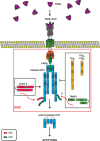Getting TRAIL back on track for cancer therapy
- PMID: 24948009
- PMCID: PMC4131183
- DOI: 10.1038/cdd.2014.81
Getting TRAIL back on track for cancer therapy
Abstract
Unlike other members of the TNF superfamily, the TNF-related apoptosis-inducing ligand (TRAIL, also known as Apo2L) possesses the unique capacity to induce apoptosis selectively in cancer cells in vitro and in vivo. This exciting discovery provided the basis for the development of TRAIL-receptor agonists (TRAs), which have demonstrated robust anticancer activity in a number of preclinical studies. Subsequently initiated clinical trials testing TRAs demonstrated, on the one hand, broad tolerability but revealed, on the other, that therapeutic benefit was rather limited. Several factors that are likely to account for TRAs' sobering clinical performance have since been identified. First, because of initial concerns over potential hepatotoxicity, TRAs with relatively weak agonistic activity were selected to enter clinical trials. Second, although TRAIL can induce apoptosis in several cancer cell lines, it has now emerged that many others, and importantly, most primary cancer cells are resistant to TRAIL monotherapy. Third, so far patients enrolled in TRA-employing clinical trials were not selected for likelihood of benefitting from a TRA-comprising therapy on the basis of a valid(ated) biomarker. This review summarizes and discusses the results achieved so far in TRA-employing clinical trials in the light of these three shortcomings. By integrating recent insight on apoptotic and non-apoptotic TRAIL signaling in cancer cells, we propose approaches to introduce novel, revised TRAIL-based therapeutic concepts into the cancer clinic. These include (i) the use of recently developed highly active TRAs, (ii) the addition of efficient, but cancer-cell-selective TRAIL-sensitizing agents to overcome TRAIL resistance and (iii) employing proteomic profiling to uncover resistance mechanisms. We envisage that this shall enable the design of effective TRA-comprising therapeutic concepts for individual cancer patients in the future.
Figures




Similar articles
-
Harnessing TRAIL-induced cell death for cancer therapy: a long walk with thrilling discoveries.Cell Death Differ. 2023 Feb;30(2):237-249. doi: 10.1038/s41418-022-01059-z. Epub 2022 Oct 4. Cell Death Differ. 2023. PMID: 36195672 Free PMC article. Review.
-
The novel TRAIL-receptor agonist APG350 exerts superior therapeutic activity in pancreatic cancer cells.Cell Death Dis. 2018 May 1;9(5):445. doi: 10.1038/s41419-018-0478-0. Cell Death Dis. 2018. PMID: 29670075 Free PMC article.
-
TRAIL and other TRAIL receptor agonists as novel cancer therapeutics.Adv Exp Med Biol. 2009;647:195-206. doi: 10.1007/978-0-387-89520-8_14. Adv Exp Med Biol. 2009. PMID: 19760076 Review.
-
The TRAIL to cancer therapy: Hindrances and potential solutions.Crit Rev Oncol Hematol. 2019 Nov;143:81-94. doi: 10.1016/j.critrevonc.2019.08.008. Epub 2019 Sep 8. Crit Rev Oncol Hematol. 2019. PMID: 31561055 Review.
-
Concepts in the use of TRAIL/Apo2L: an emerging biotherapy for myeloma and other neoplasias.Expert Opin Investig Drugs. 2001 Aug;10(8):1521-30. doi: 10.1517/13543784.10.8.1521. Expert Opin Investig Drugs. 2001. PMID: 11772267
Cited by
-
Dual targeting of MDM2 with a novel small-molecule inhibitor overcomes TRAIL resistance in cancer.Carcinogenesis. 2016 Nov 1;37(11):1027-1040. doi: 10.1093/carcin/bgw088. Carcinogenesis. 2016. PMID: 27543608 Free PMC article.
-
Cancer and necroptosis: friend or foe?Cell Mol Life Sci. 2016 Jun;73(11-12):2183-93. doi: 10.1007/s00018-016-2193-2. Epub 2016 Apr 5. Cell Mol Life Sci. 2016. PMID: 27048810 Free PMC article. Review.
-
Autophagy inhibition upregulates CD4+ tumor infiltrating lymphocyte expression via miR-155 regulation and TRAIL activation.Mol Oncol. 2016 Dec;10(10):1516-1531. doi: 10.1016/j.molonc.2016.08.005. Epub 2016 Sep 16. Mol Oncol. 2016. PMID: 27692344 Free PMC article.
-
Therapeutic targeting of TRAIL death receptors.Biochem Soc Trans. 2023 Feb 27;51(1):57-70. doi: 10.1042/BST20220098. Biochem Soc Trans. 2023. PMID: 36629496 Free PMC article. Review.
-
TRAIL-based gene delivery and therapeutic strategies.Acta Pharmacol Sin. 2019 Nov;40(11):1373-1385. doi: 10.1038/s41401-019-0287-8. Epub 2019 Aug 23. Acta Pharmacol Sin. 2019. PMID: 31444476 Free PMC article. Review.
References
-
- Hanahan D, Weinberg RA. Hallmarks of cancer: the next generation. Cell. 2011;144:646–674. - PubMed
-
- Galluzi L, Kepp O, Kroemer G. Mitochondria: master regulators of danger signalling. Nat Rev. Mol Cell Biol. 2012;13:780–788. - PubMed
-
- Green DR, Kroemer G. The pathophysiology of mitochondrial cell death. Science. 2004;305:626–629. - PubMed
-
- Lowe SW, Bodis S, McClatchey A, Remington L, Ruley HE, Fisher DE, et al. p53 status and the efficacy of cancer therapy in vivo. Science. 1994;266:807–810. - PubMed
Publication types
MeSH terms
Substances
Grants and funding
LinkOut - more resources
Full Text Sources
Other Literature Sources

